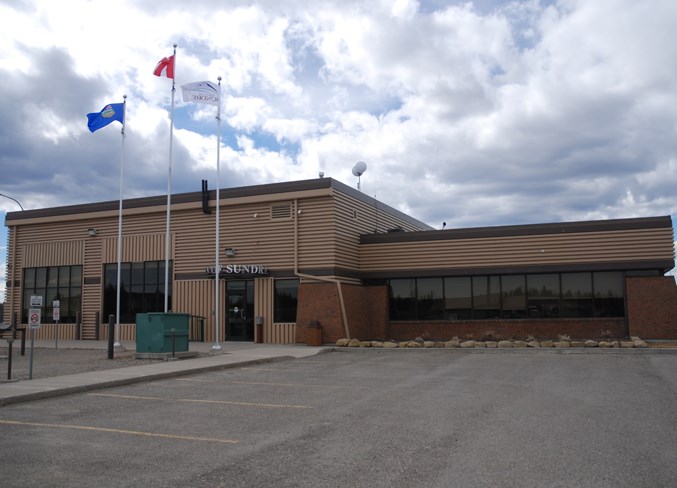Sundre electricity customers will see a nominal increase on their FortisAlberta bill starting next year.
Council agreed during the Oct. 7 meeting to approve a 10 per cent franchise fee starting Jan. 1, 2020, up from this year’s nine per cent.
The franchise fee is a part of the Electric Distribution System Franchise Agreement, first introduced in 2013 by the council of the day to directly offset taxes.
“Every year we are requested by Fortis to determine whether or not we want to increase, decrease or leave our franchise fee the same,” said Chris Albert, director of corporate services, during a presentation outlining administration’s recommended course of action.
The franchise fee, explained Albert, is a percentage charged by Fortis on top of the monthly bill, and that revenue comes back to the municipality.
Last year, the rate was held at nine per cent, keeping Sundre comparable to other municipalities in the region, he added.
Meanwhile, the Town of Olds in 2019 increased its rate to 15 per cent from about 8.5 per cent, said Albert, adding he did not known that council’s intention for next year.
The director of corporate services said Sundre should increase the franchise fee to 10 per cent to be inline with neighbouring municipalities. On average that would represent a monthly increase of an additional $0.65, he said.
In 2019 under the nine per cent fee, he said the average monthly bill had an additional $5.82, which represents revenue generated for the municipality. Increasing the fee by one per cent, he added, would increase that average to about $6.47 on top of the regular monthly bill.
Meanwhile, Fortis has proposed a slight decrease to the per kilowatt rate for its 2020 rates, with a minor increase to its flat rate, essentially a redistribution that will have a negligible impact on the average monthly bill, he said.
“Fortis is not really changing the average bill very much as far as we can tell.”
Administration’s recommended motion, he said, did not include direction to designate the revenue generated by the fee to any specific restricted surplus accounts.
“Those restricted surplus amounts are determined as part of the budgeting process,” he said.
“So there’s no sense in putting it into an additional motion and complicating matters.”
While administration recommended setting the fee at 10 per cent, he said council could choose any percentage it deems fit.
According to background information outlined in council's agenda, the fee left at nine per cent would bring in about $175,000, and that at 10 per cent, the fee would generate approximately $194,500.
Initiating a discussion, Coun. Cheri Funke presented her own motion to set the fee at 10 per cent, with all of the revenue generated to be allocated in the infrastructure surplus to be earmarked specifically for the future wastewater lagoon upgrades.
Coun. Richard Warnock was opposed to the motion as worded. He agreed that the budgeting process is lengthy and provides ample opportunity to discuss how to designate revenue.
“Allocating those funds should be decided during the budgeting process,” he said, speaking in favour of the motion as recommended by administration.
Mayor Terry Leslie agreed with Warnock, and said that while he supports increasing the fee to 10 per cent, he did not agree with allocating funds prior to budget deliberations.
“The reason I went with this,” said Funke, “is because we all know that as it sits right now, there’s (an impending) 12 per cent increase in taxes because of the upgrade.”
Council endeavours to come up with ways to cover expenses without placing the entire burden on the backs of taxpayers, and Funke said she wanted to minimize the anticipated 12 per cent tax increase, or at least work towards it.
Leslie said he had not heard of that forecasted tax increase, and Funke pointed out that it’s part of the information outlined in the municipality’s long-term capital budget for 2021.
Her motion was narrowly defeated by one vote, with councillors Charlene Preston, Todd Dalke, and Funke in favour, and Leslie, Warnock as well as councillors Rob Wolfe and Paul Isaac opposed.
Warnock proceeded to make the motion recommended by administration to set the franchise fee at 10 per cent effective Jan. 1.
The mayor wondered if Olds had a specific project they’re pursuing, but Albert was not certain what that municipality’s reasoning was behind increasing its fee to 15 per cent from 8.5 per cent.
Leslie described the fee as “a tool that council can use to generate revenue from folks who don’t sometimes pay taxes, like churches, schools, and hospitals.”
That revenue, which at a 10 per cent fee amounts to about $194,000, can be used at council’s discretion, he said.
Funke reminded her colleagues that groups and organizations like churches, schools and hospitals “don’t pay property tax, so they don’t pay for our wastewater treatment plant. But they use it.”
Warnock’s motion was passed.



